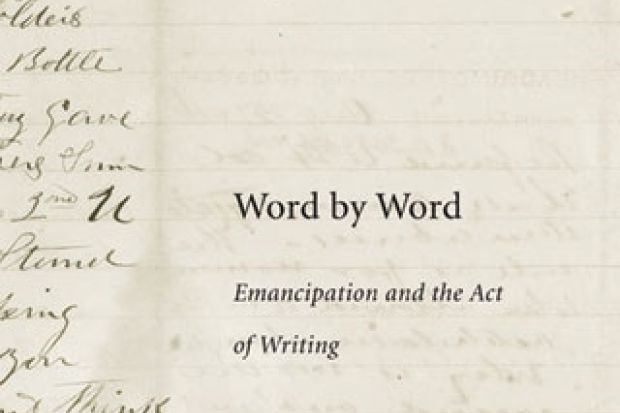Learning would spoil the best nigger in the world,” blasted one slaveholder, “it would forever unfit him to be a slave.” As Word by Word makes clear, enslaved people understood this fundamental tension and many of them, including former slave and prominent abolitionist Frederick Douglass, attempted to harness the power of the written word. For Douglass, who would later write the most widely read account of American bondage, literacy opened “the pathway from slavery to freedom”. That pathway was anything but easy, for as he read and contemplated texts of an increasingly political nature, Douglass writhed in “unutterable anguish”. Literacy had opened his eyes to “the horrible pit” of slavery but also reaffirmed his “wretched condition”.
Douglass’ plight was not unusual in mid-19th-century America. Literacy provided a vocabulary of citizenship rights for enslaved peoples; it served as a conduit for political and personal protest; it enabled freed people to express their identities, opinions and feelings; yet it also entangled them in new dependencies with state and military authorities. Through a series of bold, imaginative and insightful case studies, Christopher Hager uncovers the intellectual world of US slavery and charts the hopes, expectations and fears of enslaved writers. Thomas Ducket, for instance, a barely literate slave sold away from his family to Louisiana, reveals the anguish of separation in his plaintive plea to white abolitionist Jacob Bigelow. Ducket’s crooked lines and shaky penmanship expose the intensity of isolation and the totality of enslavement, even as they carry forth a hopeful, desperate message of family love.
Becoming free in the South was hard, taxing work, experienced, defined and learned through thousands of actions and words
Others turned their hands to more declaratory statements. The enslaved potter Dave etched his own independent thoughts into jars, while John Washington composed a diary that was self-consciously crafted to give voice to the bondsman and his dawning vision of freedom. What Hager calls “unfinished reckonings” with the past, present and future form one strand of the slaves’ epistolary culture, but over time these autobiographical manifestos morphed into communal and unified visions of freedom. Jubilation, however, gave way to the realities of emancipation. To voice their claims for property, wages and rights, barely literate farm workers explored in laboured sentences the meanings and limits of emancipation. The burgeoning mass of petitions and appeals helped define the contours of freedom, marking out the sketchy terms of citizenship and enumerating the hostilities and racial tensions of post-war life. Literacy made freedom real for many former slaves yet as Hager deftly shows, dependency and vulnerability continued to haunt African Americans whose entreaties to white military and civic officers reveal just how narrow the pathways out of slavery ultimately proved to be.
Like the awkward prose and sweated penmanship of the former slaves’ petitions, becoming free in the American South was hard, taxing work, where freedom was experienced, defined and learned through thousands of actions and words. By understanding emancipation as a slow process rather than a rapid transformation, Word by Word shows how literacy was an incomplete and sometimes flawed instrument of black self-determination. The idea of emancipation as an unfinished revolution is not new, nor is the attention to subterranean networks of enslaved information and exchange particularly novel in slavery studies. By rendering legible and audible the writings of the literate minority, however, Hager reveals the desperate and creative measures taken by former slaves to assert their communal and individual voices. Most of course continued unlettered, but the striking improvement in black literacy during the two decades after emancipation (from 10 to 30 per cent) is testimony to the enduring importance attached to the written word and the empowering potential of African-American writing.
Word by Word: Emancipation and the Act of Writing
By Christopher Hager
Harvard University Press, 328pp, £29.95
ISBN 9780674059863 and 067486 (e-book)
Published 28 February 2013
Register to continue
Why register?
- Registration is free and only takes a moment
- Once registered, you can read 3 articles a month
- Sign up for our newsletter
Subscribe
Or subscribe for unlimited access to:
- Unlimited access to news, views, insights & reviews
- Digital editions
- Digital access to THE’s university and college rankings analysis
Already registered or a current subscriber? Login




